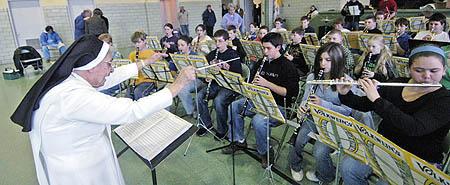
They said organizing band programs
wouldn't work, but Sister Serafina proved them wrong
Music of the Spirit
They told her it couldn't be done.
Sister Serafina Viagrande had a dream to some day provide instrumental
music education in Catholic elementary schools on a grand scale.
"My whole life was music as a child," she said. "I
realized the importance of music, and I saw the lack of music
in Catholic schools."
When she was an enthusiastic young nun wanting to organize multiple
band programs during the 1950s in Columbus, Ohio, several priests
told her it would never work.
Sister Serafina proved them wrong in Pittsburgh.
The instrumental music program she manages for the Catholic Diocese
of Pittsburgh has grown to include 76 schools and is believed to
be the largest band program for Catholic school elementary pupils
in the country.
This year marks her 25th anniversary at the helm of the band program.
"By providing children this chance to play instruments, they can
discover if they have the gift," she said. "Even if they don't
continue their whole life, they can have an appreciation for what's
good in music."
While a growing number of religious sisters no longer wear the
traditional habit, Sister Serafina, 76, said she always will do
so because it's her way of representing God to people without having
to say a word.
Her band pupils are her disciples. She is the tiny, soft-spoken,
but stern music teacher who insists they sit up straight, behave
and pay attention throughout concert rehearsals that run up to
41/2 hours. She seldom has to correct anyone. Students respect
her as a nun and a musician.
"We never wanted to push the envelop with her because she made
music important enough that we really wanted to do it well," said
Tom Wilson, 50, of the North Side, a former student at St. Thomas
District High School in Braddock.
Some of her students went on to earn advanced degrees in music.
John Rogel, 50, who also attended St. Thomas, received a bachelor's
degree in music from the University of Maryland. He's now a professional
classical music teacher and opera singer in Bowie, Md. Sister Serafina
taught him to play bass viol.
"Her deep understanding and her love for music is what inspired
me most," he said.
The total enrollment in her band program this year falls just
shy of 2,000 elementary school pupils, 36 band directors and five
district managers.
Although the National Catholic Education Association in Washington,
D.C., keeps no official records on elementary school band memberships,
officers there believe her program could be the largest of its
kind in the nation.
"It is very extraordinary, especially in this day and age," said
Sister Mary Dawson, assistant elementary school executive director
for NCEA. "More often those programs are run by musicians from
the local areas who are willing to take on music lessons for one
or maybe two schools. What she is doing is a rarity across the
country."
The Rev. Kris Stubna, diocesan secretary for education, said 80
percent of all elementary schools in the diocese participate in
her band program.
"Music is one of those things that gets set aside because of curriculums
and budgets," Father Stubna said. "But music is another language
that opens the mind and heart to human understanding in a different
kind of way.
"She really believes getting children in music learning at an
early age will have a profound impact on their lives," he said.
At a time when many Catholic schools are struggling to pay salaries
for classroom teachers, her band program has grown from 22 to 76
schools over the years, largely because it costs schools nothing
to provide it.
The Diocese of Pittsburgh pays Sister Serafina a stipend of $1,000
a month and parents of band students pay her a $10 annual fee for
each child in the program. She provides a band teacher for each
of the schools. Parents pay those teachers $18 to $26 a month for
each band student.
"In the past, teachers got a percentage of what the parents paid
outside companies that ran the program," Sister Serafina said. "When
I took it over, I felt the teachers deserved to get all the payment,
and they stayed."
Only in the past few years has Sister Serafina given up teaching
in schools, limited her travel and shifted the bulk of her duties
to administering the program, which she does from an office at
St. Aloysius Rectory in Reserve.
Her best students in each district have the opportunity to perform
concerts as a group in Honors Band and the All-Star Band at no
additional cost.
A Dominican Sister of St. Mary of the Springs, Sister Serafina
came to the United States from Sicily as a baby in 1931, joined
the convent in 1949 in Columbus and was sent to Pittsburgh in 1965.
Violin is her main instrument, but she has studied all band and
string instruments and holds a master's degree in music education
from Ohio State University.
She used to play the violin with the University of Pittsburgh
Community Orchestra, the Wilkinsburg Symphony and the Pittsburgh
Savoyards. She continues to perform on the violin in church and
in the convent.
The Rev. Hugh Lang, former superintendent of Catholic Schools
for the diocese, made it possible for Sister Serafina to fulfill
her life's ambition when he appointed her in 1982 to coordinate
the instrumental music program.
The band program was declining steadily under the leadership of
outside companies. She feared it would fade away completely, and
she was not about to let that happen.
"Sister Serafina doesn't understand the word 'no,' " said Father
Lang, now retired and living at St. Anne's in Castle Shannon. "To
say she was appointed by me is an understatement. She appointed
herself.
"Anything she undertakes, she does it with such enthusiasm it
won't fail," Father Lang said. "She puts her heart and soul into
her work."
Charles and Jean Marie Nemeth, of Thornburg, have had six children
in Sister Serafina's music program, one of whom obtained a bachelor's
degree in music from Catholic University of America in Washington,
D.C., and a master's degree in music from the Royal Academy of
Music in London.
"Sister Serafina was essentially the capstone of all my children's
instrumental musical experience," Mr. Nemeth said. "She magnificently
incorporates the spiritual life into music. She sees music as a
spiritual undertaking. It's her method of spreading the gospel."
By Tim Grant
Pittsburgh Post-Gazette |





